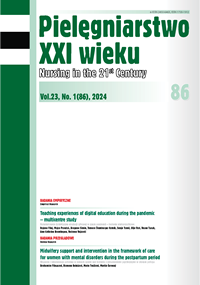The Attitudes of Polish nurses towards patients with alcohol-related problems and the subsequent impact on care delivery
DOI:
https://doi.org/10.2478/pielxxiw-2024-0008Keywords:
Alcohol use disorder, patient, nursing care, attitudes, emotionsAbstract
ABSTRACT THE ATTITUDES OF POLISH NURSES TOWARDS PATIENTS WITH ALCOHOL-RELATED PROBLEMS AND THE SUBSEQUENT IMPACT ON CARE DELIVERY
Aim. To analyse the attitudes of nursing staff towards patients with co-occurring alcohol problems.
Material and methods. The study was conducted among 120 nurses working in a tertiary hospital in the Podbeskidzie region (Poland). A diagnostic survey was used with self-administered questionnaire as the research tool.
Results. The number of 93.3% of the respondents confi rmed that they had addicts among their patients. The respondents believe that the education and social status of addicted patients (41.8%) and their gender (54%) are important in the way they are treated by medical staff and aff ect the quality of service provided. The attitudes and feelings of the respondents, when caring for patients with co-occurring alcohol problems, are most often negative or indiff erent.
Conclusions. In clinical reality, there is stigmatization and a rather unfavourable or indiff erent attitude towards patients with an accompanying alcohol problem. Nursing staff fi nd working with an alcoholic challenging and do not treat patients with co-existing alcohol use disorder on an equal footing with patients suff ering from other disease entities.
References
1. WHO. (2022) International Classification of Diseases 11th Revision. The global standard for diagnostic health information. https://icd.who.int/browse11/l-m/en#/ http://id.who.int/icd/entity/1580466198 (dostęp: 28.03.2021).
2. Carvalho AF, Heilig M, Perez A, et al. Alcohol use disorders. Lancet 2019; 394: 781¬792. http://dx.doi.org/10.1016/S0140-6736(19)31775-1.
3. WHO (2018) Global status report on alcohol and health. Geneva: World Health Organization. (Licencja: CC BY-NC-SA 3.0 IGO) (dostęp: 28.03.2021).
4. World Population Review (2022) Alcoholism by country 2022. https:// worldpopulationreview.com/country-rankings/alcoholism-by-country (dostęp: 28.03.2021).
5. Hadera F, Babuśka-Roczniak M, Brodziak-Dopierała B, i wsp. Opinia pracowników izby przyjęć na temat udzielania pomocy medycznej pacjentom będącym pod wpływem alkoholu. Med Srod 2022; 25(3-4): 59-65. https://doi:10.26444/ ms/155916.
6. Burak A, Dembna I, Cierzniakowska K, et al. The patient under the influence of alcohol - discriminated victim or aggressor? Alcoholism Drug Addiction. 2016; 29(3): 131-152. http://dx.doi.org/10.1016/j.alkona.2016.09.001.
7. Molina-Mula J, González-Trujllo A, Simonet-Bennassar M. Emergency and mental health nurses’ perceptions and attitudes towards alcoholics. Int. J. Environm. Res. Public Health. 2018; 15: 1773-1782. https://doi.org/10.3390/ijerph15081733.
8. Souza LGS, de Andrade AL, Menandro MCS, et al. Perceptions of primary health care professionals towards alcoholic patients: an exploratory study in a Brazilian municipality. Univ Psychol. 2015; 14(3): 1045-1054. https://doi.org/10.11144/ Javeriana.upsy14-3.pphc.
9. Chozom S, Neuhann F, Krahl W. Exploring the attitudes towards patients diagnosed with Alcohol Use Disorder (AUD): a qualitative study of nurses at the national referral hospital, Bhutan. J. Nurs. Pract. 2021; 4(2): 117-129. https://doi.org/10.30994/jnp. v4i2.116.
10. Bové HM, Lisby M, Norlyk A. Scheduled care - as a way of caring: a phenomenological study of being cared for when suffering from alcohol use disorders. J. Clin. Nurs. 2019; 28: 1174-1182. http://dx.doi.org/10.1111/jocn.14715.
11. Seabra P., Nunes I., Silva V.,Valentim O., et al. Cultural adaptation and validation of the Attitudes Towards Alcohol Scale for health professionals in Portugal. Int J Ment Health Addiction 2023. https://doi.org/10.1007/s11469-023-01193-w
12. Rehm J. The risks associated with alcohol use and alcoholism. Alcohol Res Health 2011; 34(2): 135-143.
13. Axley PD, Richardson CT, Singal AK. Epidemiology of alcohol consumption and societal burden of alcoholism and alcoholic liver disease. Clin. Liver. Dis. 2019; 23(1): 39-50. https://doi.org/10.1016/j.cld.2018.09.011.
14. Shield KD, Parry Ch, Rehm J. Chronic diseases and conditions related to alcohol use. Alcohol Res. Curr. Rev. 2013; 35(2): 155-173.
15. Kratovil A, Schuler MS, Vottero BA, et al. Nurses’ self-assessed knowledge, attitudes, and educational needs regarding patients with substance use disorder. Am. J. Nurs. 2023; 123(4): 26-33. https://doi.org/10.1097/01.NAJ.0000925496.18847.c6.
16. van Boekel LC, Brouwers EPM, van Weeghel J, et al. Stigma among health professionals towards patients with substance use disorders and its consequences for healthcare delivery: systemic review. Drug Alcohol Depen. 2013; 131: 23-35. http://dx.doi.org/10.1016/j.drugalcdep.2013.02.018.
17. de Vargas D. Nurses’ personal knowledge and their attitudes toward alcoholism issues: a study of a sample of specialized services in Brazil. J. Nurs. Educ. Pract. 2014; 4(2): 123-131. http://dx.doi.org/10.5430/jnep.v4n2p123.
Downloads
Published
Issue
Section
License
Copyright (c) 2024 Authors

This work is licensed under a Creative Commons Attribution 4.0 International License.




